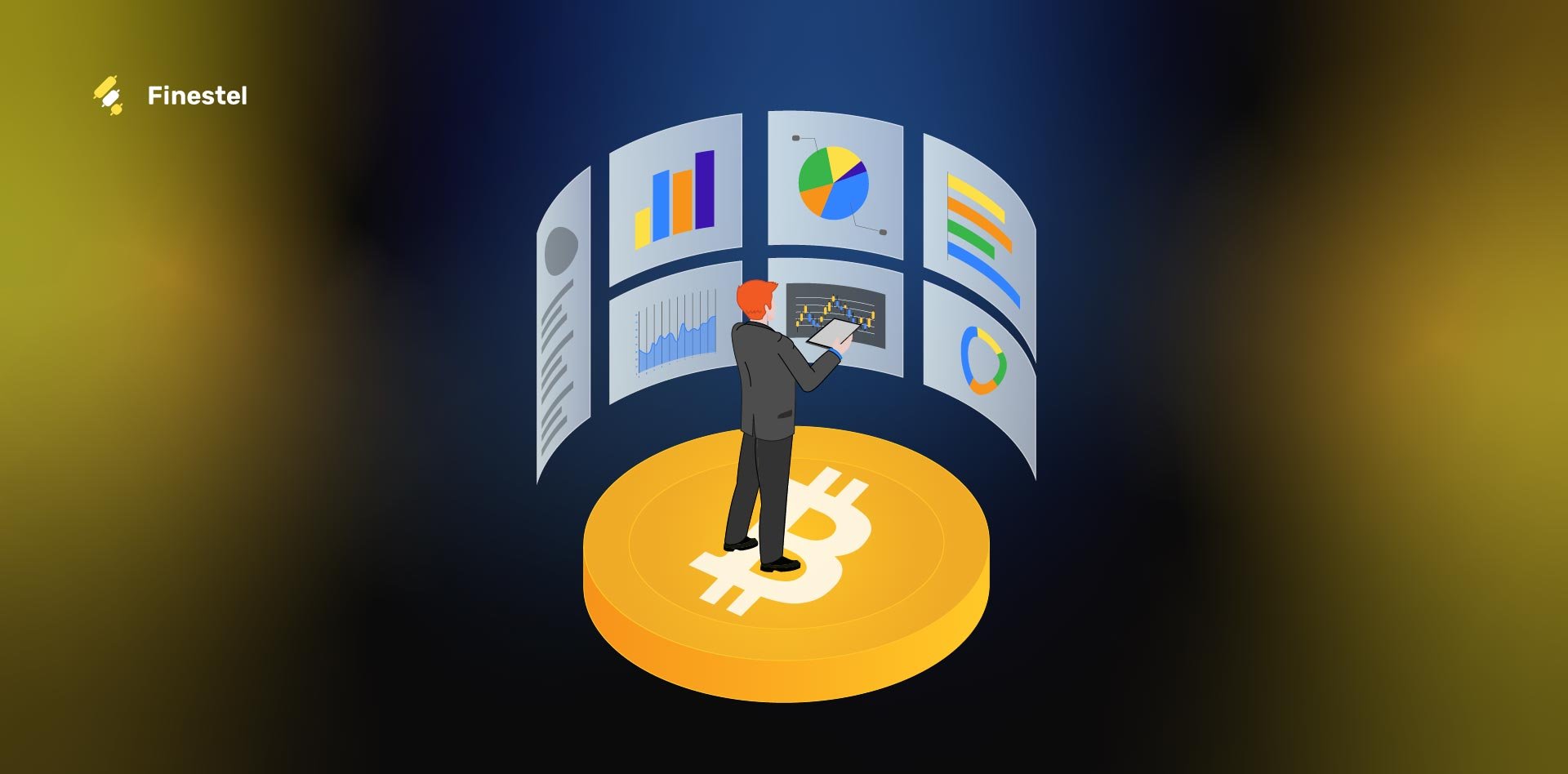Cryptocurrencies are quickly becoming the preferred form of currency among some communities around the world. Cryptocurrency exchanges have become an essential part of the digital asset ecosystem. These platforms allow users to buy, sell, and trade cryptocurrencies, making it easier for individuals to invest in digital assets. However, for those new to the world of cryptocurrency, the concept of a crypto exchange can be confusing.
In this article, we will explore what a crypto exchange is, how it works, and the different types of exchanges available. Whether you’re a seasoned investor or just starting, this article will provide you with a comprehensive understanding of crypto exchanges and their role in the cryptocurrency market.
Definition: What Is a Crypto Exchange?
A crypto exchange is a digital platform that enables the trading of cryptocurrencies using digital or fiat money, as well as other assets. Acting as intermediaries between parties, these exchanges earn revenue through transaction fees and commissions. Also known as a digital currency exchange or DCE, a crypto exchange operates similarly to traditional exchanges, allowing the buying and selling of digital assets.
The exchange of digital assets on a crypto exchange is based on the same concept as traditional exchanges. For instance, $1,000 can be exchanged for any cryptocurrency of equivalent value, and any cryptocurrency worth $1,000 can be exchanged for another currency of equivalent value, such as Ether. This system operates across all currencies traded on the exchange. A typical crypto exchange operates 24/7, ensuring that users can trade at any time, and maintains the anonymity of buyers and sellers through cryptography, ensuring secure transactions.
How Do Cryptocurrency Exchanges Work?
Crypto exchanges operate similarly to other asset exchanges, such as stock exchanges, by matching buyers with sellers. To begin trading cryptocurrencies on exchanges, users must first register and fund their accounts. Once registered, users can create various order types to buy, sell, or speculate on cryptocurrencies. These orders are compiled in an order book, which lists the amounts of cryptocurrencies that users want to buy and sell, along with their desired price. Based on this information, the exchange matches pairs of buyers and sellers.
The order book is a crucial component of a crypto exchange, as it provides transparency and liquidity to the market. It allows users to see the current supply and demand for a particular cryptocurrency, which can help inform their trading decisions. Additionally, the order book ensures that trades are executed at fair market prices, as buyers and sellers are matched based on their desired prices. Overall, the order book and matching system (engine) are essential features of a crypto exchange, enabling users to trade cryptocurrencies efficiently and effectively.
Differences Between Cryptocurrency Brokers and Exchanges
Cryptocurrency brokers and exchanges are two distinct platforms that enable users to buy, sell, and trade cryptocurrencies. The main difference between cryptocurrency brokers and exchanges is how they function:
Cryptocurrency exchanges:
– Act as intermediaries between buyers and sellers, matching orders and facilitating transactions
– Offer a wider range of cryptocurrencies and trading pairs
– Allow users to set their own prices and execute trades based on market conditions
– Require more technical knowledge to use effectively
– Generate revenue through transaction fees and commissions
Cryptocurrency brokers:
– Allow users to buy and sell cryptocurrencies directly from the broker
– Offer a smaller selection of cryptocurrencies and trading pairs
– Set the prices themselves, rather than allowing users to set their own prices
– Are generally easier to use and require less technical knowledge
– May offer additional services such as portfolio management and investment advice.
Regarding fees, crypto brokers charge as high as 2-3% per transaction, while crypto exchanges usually pair you with other buyers/sellers and charge minimal transaction fees. Additionally, cryptocurrency brokers offer little to no access to trading data or analysis tools, while crypto exchanges have advanced charts and tools to enhance trading.
Brief History of Crypto Exchanges and Their Evolution Over Time
Crypto exchanges have come a long way in the past decade. The first crypto exchange, BitcoinMarket.com, was founded in March 2010. From there, numerous other exchanges followed, offering the ability to trade various cryptocurrency assets.
As digital currency continued gaining popularity, the crypto exchange market changed accordingly. Soon, global investors began utilizing these platforms to buy and sell various coins. This caused the emergence of new business models, such as decentralized exchanges (DEXs), which are hosted on blockchain networks and allow for peer-to-peer (P2P) trading without any intermediaries or third parties involved.
Today’s crypto exchanges provide more options for users purchasing digital assets. In addition to DEXs, centralized crypto exchanges (CEXs) have become popular due to their user-friendly platforms and a large selection of coins available for purchase and trade. Whether you’re a novice or an experienced trader, finding a crypto exchange that meets your needs is easier than ever.
Definition and Explanation of KYC in Crypto Exchange
If you’re familiar with crypto exchanges, you’ve probably heard the term “KYC” thrown around. KYC stands for “Know Your Customer,” and it’s a process designed to verify users’ identities. This process is legally mandated and requires that customer identification and verification are completed before any services can be offered to them.
Implementing KYC on crypto exchanges enables authorities to easily identify, monitor, and regulate suspicious activities like money laundering. For this reason, most exchanges require users to provide personal information such as their full name, date of birth, address, phone number, and government-issued ID card numbers before they can buy, sell, or trade any cryptocurrencies.
At some exchange platforms, KYC may have additional steps, such as face verification through web cameras or images of ID cards. The process typically takes only a few minutes, but this depends on the exchange’s policies. Once a crypto exchange’s KYC protocol has verified your identity, you can start trading without repeating this process.
Why is KYC Required for Crypto Exchanges?
KYC, or Know Your Customer, is required for crypto exchanges to prevent illegal activities such as money laundering, terrorist financing, and other fraudulent activities. By verifying the identity of their customers, exchanges can ensure that they are not facilitating illegal activities. KYC procedures also help exchanges comply with regulations and avoid legal penalties.
Crypto exchanges are required to comply with anti-money laundering (AML) and counter-terrorism financing (CTF) regulations, which require them to implement KYC procedures. These regulations are designed to prevent the use of cryptocurrencies for illegal activities, such as money laundering and terrorist financing. By implementing KYC procedures, exchanges can ensure that their customers are not engaging in illegal activities and can comply with these regulations.
Types of Cryptocurrency Exchanges
When starting in the crypto world, it is crucial to understand the different types of cryptocurrency exchanges, as they vary in cost, security, and support. Crypto exchanges are broadly divided into three categories – Centralized Exchanges (CEX), Decentralized Exchanges (DEX), or Hybrid Exchanges (HEX).

What is a Centralized Crypto Exchange (CEX)?
A Centralized Crypto Exchange (CEX) is a type of cryptocurrency exchange that is operated by a central authority or company. In other words, it is a platform where users can buy, sell, and trade cryptocurrencies, but the exchange is controlled by a single entity. This entity is responsible for managing the exchange’s servers, security, and user accounts.
CEXs are the most common type of cryptocurrency exchange and are often used by beginners and casual traders. They offer a user-friendly interface and a wide range of trading pairs, making it easy for users to buy and sell cryptocurrencies. CEXs also typically offer high liquidity, meaning that users can easily buy and sell cryptocurrencies at market prices.
However, CEXs are also criticized for their centralization, which makes them vulnerable to hacking and other security breaches. Additionally, CEXs require users to trust the exchange with their funds, as the exchange controls the private keys to the users’ wallets. This can be a concern for users who prioritize security and decentralization.
In summary, a Centralized Crypto Exchange (CEX) is a type of cryptocurrency exchange that is operated by a central authority or company. While they offer a user-friendly interface and high liquidity, they are also criticized for their centralization and potential security vulnerabilities.
Advantages and Disadvantages of Centralized Crypto Exchanges
Centralized crypto exchanges offer many benefits to users, but some potential drawbacks should be considered. Here are some of the advantages and disadvantages of using a centralized crypto exchange:
- User-friendly interface and easy to use for beginners and casual traders
- High liquidity, meaning that users can easily buy and sell cryptocurrencies at market prices
- Wide range of trading pairs available
- Typically offer advanced trading features such as margin trading and stop-loss orders
- Often have customer support available to assist users with any issues
- Centralized control makes them vulnerable to hacking and other security breaches
- Users must trust the exchange with their funds, as the exchange controls the private keys to the users’ wallets
- May require users to complete KYC procedures, which can compromise privacy
- May be subject to government regulations and restrictions
- Lack of transparency in pricing and trading volume, as exchanges may engage in market manipulation
Examples of Popular Centralized Crypto Exchanges:
Centralized crypto exchanges are a popular way to buy and sell cryptocurrencies. Here are some examples of the most popular centralized crypto exchanges available today:
- Binance: Binance is the world’s leading crypto exchange, with over 3 million daily transactions. Binance supports hundreds of digital assets, offers margin trading, and uses advanced security protocols to keep user funds safe and secure.
- Coinbase: Coinbase is one of the most popular exchanges in the United States. It has earned its fame by offering customers easy-to-use features, a robust selection of digital currencies, and top-of-the-line customer service. Coinbase also boasts high liquidity, allowing users to quickly buy and sell a variety of cryptos without waiting for orders to be filled.
- Kraken: Kraken is another excellent choice for a reliable exchange platform for individual traders. The platform supports hundreds of cryptocurrencies and offers customers low fees on trades as well as advanced trading tools and chart analysis features. Additionally, Kraken maintains robust security protocols to ensure funds are kept safe from malicious actors.
- Bybit: Bybit is a popular exchange that specializes in derivatives trading, including perpetual contracts and futures contracts. It is known for its high level of security and advanced trading features, including a customizable trading interface and a range of order types. Bybit also offers a range of other services, including a mobile app for trading on-the-go and a referral program for earning rewards.
-
Kucoin: Kucoin is a fast-growing exchange that offers a wide range of trading pairs and advanced trading features, including margin trading and futures trading. It is known for its low trading fees and high level of security, making it a popular choice for both beginner and advanced traders. Kucoin also offers a range of other services, including a wallet for storing cryptocurrencies and a referral program for earning rewards.
What is a Decentralized Crypto Exchange (DEX)?
A Decentralized Crypto Exchange (DEX) is a type of cryptocurrency exchange that operates on a decentralized network, rather than being controlled by a central authority or company. In other words, it is a platform where users can buy, sell, and trade cryptocurrencies in a peer-to-peer (P2P) manner without the need for a central intermediary.
DEXs operate on a blockchain network, which allows for secure and transparent transactions without the need for a central authority. Users retain control of their private keys and can trade cryptocurrencies directly with other users on the network. This eliminates the need for a central authority to hold users’ funds and reduces the risk of hacking and other security breaches.
DEXs are often praised for their decentralization and transparency, as they operate on a public blockchain network that is accessible to anyone. They also offer greater privacy, as users do not need to complete KYC procedures to use the platform. However, DEXs are often criticized for their lower liquidity and limited trading pairs, which can make it more difficult for users to buy and sell cryptocurrencies at market prices.
Advantages and Disadvantages of Decentralized Crypto Exchanges
The advantages and disadvantages of a decentralized crypto exchange can depend on a user’s situation or preferences. Here are the advantages and disadvantages of Decentralized Crypto Exchanges (DEXs) in bullet points:
Advantages:
– Decentralized control reduces the risk of hacking and other security breaches
– Users retain control of their private keys and funds
– Greater privacy, as users do not need to complete KYC procedures to use the platform
– Transparent transactions on a public blockchain network
– No central authority or company controlling the exchange
Disadvantages:
– Lower liquidity and limited trading pairs compared to centralized exchanges
– Slower transaction times due to the need for blockchain confirmation
– Less user-friendly interface and may require technical knowledge to use effectively
– Lack of customer support available to assist users with any issues
– May be subject to government regulations and restrictions
Examples of Popular Decentralized Crypto Exchanges
Here are some examples of popular Decentralized Crypto Exchanges (DEXs):
-
Uniswap: Uniswap is a decentralized exchange that operates on the Ethereum. It allows users to trade Ethereum-based tokens in a peer-to-peer manner, without the need for a central authority.
-
PancakeSwap: PancakeSwap is a decentralized exchange that operates on the Binance Smart Chain. It allows users to trade Binance Smart Chain-based tokens in a peer-to-peer manner.
-
SushiSwap: SushiSwap is a decentralized exchange that operates on the Ethereum blockchain. It allows users to trade Ethereum-based tokens in a peer-to-peer manner, and also offers liquidity pools for users to earn rewards.
-
Curve: Curve is a decentralized exchange that focuses on stablecoins, allowing users to trade stablecoins in a peer-to-peer manner.
What is a Hybrid Exchange (HEX)?
A Hybrid Exchange (HEX) is a type of cryptocurrency exchange that combines the features of both Centralized Crypto Exchanges (CEXs) and Decentralized Crypto Exchanges (DEXs). In other words, it is a platform that offers the security and anonymity of a DEX with the regulation and customer service of a CEX.

HEXs typically operate on a decentralized network, allowing users to trade cryptocurrencies in a peer-to-peer manner without the need for a central authority. However, they also offer features such as customer support, KYC procedures, and regulatory compliance, which are typically associated with centralized exchanges.
Advantages and Disadvantages of Hybrid Crypto Exchange
Here are the advantages and disadvantages of Hybrid Crypto Exchanges (HEXs):
Advantages:
– Offers the security and anonymity of a DEX with the regulation and customer service of a CEX
– Provides a user-friendly interface and a wide range of trading pairs
– Offers high liquidity, meaning that users can easily buy and sell cryptocurrencies at market prices
– Typically offers advanced trading features such as margin trading and stop-loss orders
– Often have customer support available to assist users with any issues
Disadvantages:
– May still require users to complete KYC procedures, which can compromise privacy
– May be subject to government regulations and restrictions
– May still be vulnerable to hacking and other security breaches, although to a lesser extent than CEXs
– May have higher fees compared to DEXs due to the added regulation and customer service
Examples of Popular Hybrid Crypto Exchanges
There are not many examples of Hybrid Crypto Exchanges (HEXs) available in the market yet, but here are a few examples:
- Binance: Binance is a centralized exchange that also offers a decentralized exchange platform called Binance DEX. Binance DEX operates on the Binance Chain, which is a blockchain network that allows for secure and transparent transactions without the need for a central authority.
- BitMax: BitMax is a centralized cryptocurrency exchange that also offers a decentralized exchange platform called BitMax Pro. BitMax Pro operates on the Ethereum blockchain and allows users to trade Ethereum-based tokens in a peer-to-peer manner.
- KuCoin: KuCoin is a centralized cryptocurrency exchange that also offers a decentralized exchange platform called KuCoin DEX. KuCoin DEX operates on the KuCoin blockchain network and allows users to trade cryptocurrencies in a peer-to-peer manner.
Top 10 Crypto Exchanges by Trading Volume
Out of all the cryptocurrency exchanges available, we’ve compiled a list of what we believe to be the top 10 best crypto exchanges. The data in the table is only valid at the time of writing the article and may change later:
User Reviews and Ratings of Popular Crypto Exchanges
It’s important to note that user reviews and ratings can be subjective and may not reflect the experiences of all users. It’s always recommended to do your own research and due diligence before choosing a cryptocurrency exchange to use.
Binance
Binance is a popular cryptocurrency exchange with a 4.5-star rating on Trustpilot. Users praise Binance for its user-friendly interface, high liquidity, and wide range of trading pairs. However, some users have reported issues with customer support and account verification.
Coinbase
Coinbase is a popular cryptocurrency exchange with a 3.9-star rating on Trustpilot. Users praise Coinbase for its ease of use and security features. However, some users have reported issues with high fees and slow customer support.
Kraken
Kraken is a popular cryptocurrency exchange with a 3.8-star rating on Trustpilot. Users praise Kraken for its security features and low fees. However, some users have reported issues with slow customer support and account verification.
KuCoin
KuCoin is a popular cryptocurrency exchange with a 4.2-star rating on Trustpilot. Users praise KuCoin for its user-friendly interface and high liquidity. However, some users have reported issues with account verification and customer support.
Bitfinex
Bitfinex is a popular cryptocurrency exchange with a 3.8-star rating on Trustpilot. Users praise Bitfinex for its advanced trading features and high liquidity. However, some users have reported issues with account verification and customer support.
Comparison of Features and Fees of Leading Crypto Exchanges
Cryptocurrency exchanges are becoming an increasingly important part of the crypto scene. With more and more users entering the market, it is important to understand the features and fees offered by leading crypto exchanges.
You can compare the features and fees of some of the leading crypto exchanges below:
| Crypto Exchange | Target User | Trading fees | Fiat Withdrawal Fees | Security | Countries | Languages |
| Binance | Experts | low | low | 3* | 200+ | EN + 27 |
| Coinbase | Beginners & Experts | high | low | 4* | 100+ | EN +12 |
| Kraken | Beginners & Experts | medium | low | 4* | 200+ | EN + 13 |
| Bitstamp | Beginners | high | low | 4* | 200+ | EN |
| Bitfinex | Experts | medium | high | 3* | 200+ | EN + 3 |
| Poloniex | Experts | low | medium | 3* | 200+ | EN + 4 |
| OKX | Experts | low | OKX does not support any fiat deposits or withdrawals | 3* | 200+ | EN + 19 |
How to Identify Good Crypto Exchanges?
When researching crypto exchanges, there are a few key points to remember to ensure that you’re dealing with a quality platform. It’s important to make sure that the exchange is:
- Security: Look for exchanges that have strong security measures in place, such as two-factor authentication, cold storage, and insurance against hacking and theft.
- Reputation: Research the reputation of the exchange by reading user reviews and ratings on websites such as Trustpilot and Reddit. Look for exchanges that have a good track record of reliability and customer support.
- Trading volume: Consider the trading volume of the exchange, as higher trading volume can indicate greater liquidity and a more active user base.
- User interface: Look for exchanges that have a user-friendly interface and offer a wide range of trading pairs and order types.
- Fees: Consider the fees charged by the exchange for trading, depositing, and withdrawing cryptocurrencies. Look for exchanges that have competitive fees and transparent fee structures.
- Regulatory compliance: Look for exchanges that are compliant with relevant regulations in their jurisdiction, such as anti-money laundering (AML) and know-your-customer (KYC) regulations.
- Customer support: Consider the quality of customer support offered by the exchange, such as response times and the availability of support channels.
It’s important to note that the factors to consider when identifying good cryptocurrency exchanges can vary depending on individual preferences and needs. It’s always recommended to do your own research and due diligence before choosing a cryptocurrency exchange to use.
Red Flags to Watch Out for When Selecting a Crypto Exchange
Here are some red flags to watch out for when selecting a cryptocurrency exchange that may indicate a scam:
- Unsolicited offers: It may be a red flag if you receive unsolicited offers to invest in a cryptocurrency exchange. Scammers often use unsolicited offers to lure in unsuspecting investors.
- Lack of information: If an exchange does not provide detailed information about its team, location, or regulatory compliance, it may be a red flag.
- Promises of high returns: If an exchange promises high returns on investment with little or no risk, it may be a red flag. Cryptocurrency investments are inherently risky, and no legitimate exchange can guarantee high returns.
- Pressure to invest quickly: If an exchange pressures you to invest quickly without giving you time to do your own research, it may be a red flag. Scammers often use high-pressure tactics to get investors to make hasty decisions.
- Unusual payment methods: If an exchange requires payment in unusual or non-traditional payment methods, such as gift cards or wire transfers, it may be a red flag. Legitimate exchanges typically accept payment in traditional methods, such as credit cards or bank transfers.
- Lack of customer support: If an exchange has poor or non-existent customer support, it may be a red flag. Scammers often do not provide customer support or make it difficult to contact them.
- Phishing scams: If an exchange sends you unsolicited emails or messages asking for your personal information or login credentials, it may be a phishing scam. Always verify the authenticity of any communication from an exchange before providing any personal information.
It’s important to note that these red flags are not definitive indicators of a scam, but they should be taken into consideration when selecting a cryptocurrency exchange. It’s always recommended to do your own research and due diligence before choosing a cryptocurrency exchange to use.
Are Crypto Exchanges Regulated?
The regulation of cryptocurrency exchanges varies depending on the country or region in which they operate. In some countries, cryptocurrency exchanges are regulated by government agencies, while in others, they operate in a regulatory gray area.
In the United States, for example, cryptocurrency exchanges are regulated by the Financial Crimes Enforcement Network (FinCEN) and must comply with anti-money laundering (AML) and know-your-customer (KYC) regulations. Additionally, some states have their own regulations for cryptocurrency exchanges, such as the New York State Department of Financial Services’ BitLicense.
In the European Union, cryptocurrency exchanges are regulated under the Fifth Anti-Money Laundering Directive (5AMLD), which requires exchanges to register with their national financial regulator and comply with AML and KYC regulations.
In other countries, such as China, cryptocurrency exchanges are banned or operate in a regulatory gray area.
It’s important to note that the regulation of cryptocurrency exchanges is still evolving and can vary widely depending on the country or region. It’s always recommended to do your own research and due diligence before choosing a cryptocurrency exchange to use.
How Do Exchanges Make Money (Revenue Model)?
Cryptocurrency exchanges make money through various revenue models, including:
-
Trading fees: Most cryptocurrency exchanges charge a fee for each trade made on their platform. These fees can vary depending on the exchange and the trading volume of the user.
-
Listing fees: Some exchanges charge a fee for listing new cryptocurrencies on their platform. This fee can vary depending on the exchange and the popularity of the cryptocurrency.
-
Withdrawal fees: Some exchanges charge a fee for withdrawing cryptocurrencies from their platform. This fee can vary depending on the exchange and the cryptocurrency being withdrawn.
-
Margin trading fees: Some exchanges offer margin trading, which allows users to trade with borrowed funds. These exchanges may charge a fee for margin trading.
-
API access fees: Some exchanges charge a fee for access to their API, which allows developers to build applications that interact with the exchange.
-
Advertising: Some exchanges may generate revenue through advertising on their platform.
-
Interest on deposits: Some exchanges offer interest on cryptocurrency deposits, which can generate revenue for the exchange.

Crypto Exchange vs. Crypto Wallet: What’s the Difference?
In summary, a cryptocurrency exchange is a platform that allows users to buy, sell, and trade cryptocurrencies, while a cryptocurrency wallet is a software program or hardware device that allows users to store, send, and receive cryptocurrencies. Exchanges typically offer a variety of trading pairs, order types, and trading tools to help users manage their cryptocurrency investments, while wallets generate a unique public address and private key for each cryptocurrency, which allows users to send and receive cryptocurrencies securely.
While exchanges and wallets both play important roles in the cryptocurrency ecosystem, they serve different purposes and functions. Exchanges are primarily used for buying, selling, and trading cryptocurrencies, while wallets are primarily used for storing, sending, and receiving cryptocurrencies. It’s important to use both exchanges and wallets responsibly and to do your own research and due diligence before choosing a cryptocurrency exchange or wallet to use.
Can You Keep Cryptocurrency in a Crypto Exchange, or Should You Use a Wallet Instead?
Cryptocurrency wallets and exchanges are both essential tools used to manage cryptocurrencies. Wallets are meant to keep your crypto funds safe, whereas exchanges are trading hubs where users convert fiat currency into cryptocurrencies or trade one cryptocurrency for another. While many exchanges operate their own wallets, it is generally recommended to use a separate wallet for added security and control over your private keys.
Conclusion
Cryptocurrency exchanges can be a secure and reliable method to invest in digital currencies. They offer a diverse range of services, such as spot trading and derivatives, to cater to both novice and experienced traders. It is crucial to research and comprehend the various exchanges and their features to ensure a successful trading experience. With the right information and resources, you can utilize the potential of crypto exchanges to manage your financial portfolio and reap the benefits of digital assets.
If you are interested in learning more about cryptocurrency or want to participate in this exciting new asset class, then you have come to the right place. Crypto Exchange 101 is your one-stop guide to everything you need about crypto exchanges. We’ll provide detailed explanations of how the exchanges work, what cryptocurrencies are available, and how to use them to create a portfolio of digital assets.
We’ll look at the pros and cons of crypto exchanges and provide valuable tips and strategies for navigating these platforms. With our help, you can make more informed decisions about buying, selling, and trading cryptocurrencies. So what are you waiting for? Let’s get started!!
FAQ
What Is The Role Of KYC In Crypto Exchanges?
KYC (Know Your Customer) is mandatory for most cryptocurrency exchanges to comply with anti-money laundering (AML) regulations and prevent money laundering and terrorist financing. KYC checks involve verifying the identity of users through government-issued identification documents and other personal information. KYC helps to increase security and stability in the cryptocurrency market and prevent fraudulent activities.
What Are The Tax Implications Of Using A Crypto Exchange?
The IRS generally treats cryptocurrency the same way it treats any capital gain. That is, you’ll pay ordinary tax rates on short-term capital gains.
What Are The Risks Associated With Using A Crypto Exchange?
The lack of regulatory oversight is one of the most serious risks associated with cryptocurrency exchange hacks. Unlike traditional financial institutions, cryptocurrency exchanges are not subject to the same regulations and oversight, making it more difficult to hold them accountable during a hack.
How Many Crypto Exchanges Are There?
Around 500 Crypto Exchanges worldwide, each with different features and services for new and experienced investors.
What Is The Best Crypto Exchange?
Several platforms offer different services. Could you figure out which one is best for you? Coinbase, Binance, Bitfinex, Kraken, and Gemini are some of the most famous crypto exchanges.






Leave a Reply